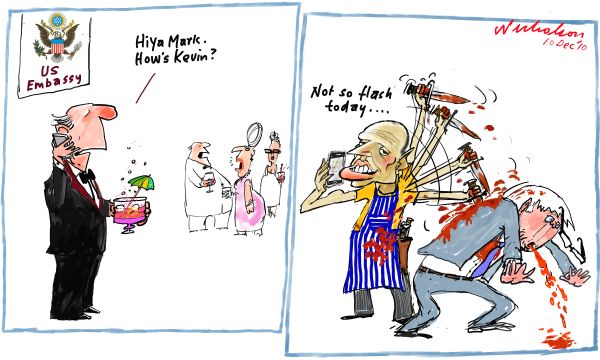Search
Recent comments
- stenography.....
14 hours 5 min ago - black....
14 hours 3 min ago - concessions.....
15 hours 5 min ago - starmerring....
19 hours 10 min ago - unreal estates....
22 hours 56 min ago - nuke tests....
23 hours 32 sec ago - negotiations....
23 hours 3 min ago - struth....
1 day 12 hours ago - earth....
1 day 13 hours ago - sordid....
1 day 13 hours ago
Democracy Links
Member's Off-site Blogs
little precious .....

According to information released by WikiLeaks, through The Sydney Morning Herald, Mark Arbib was a 'protected source' of the American Embassy in Canberra.
Writing in The Good Weekend on 12 March, Nikki Barrowclough says in an article, "The Power of One", American diplomatic cables refer to Arbib as 'a tough political operator and evidence-based strategic thinker' who had met with embassy representatives 'repeatedly throughout his political rise'. In other words he met with US representatives over a period of time on a frequent basis over a number of years.
Questioned by Barrowclough, Arbib said he was not aware of what the term 'protected source' might mean. Barrowclough asked him had he contacted the American embassy to find out. "He says that the US ambassador, Jeffrey Bleich, rang him. 'I asked him, What is a protected source? He said, The story is rubbish, and that the protect reference next to my name was in relation to conversations being my own view and not that of the government'.
A protected source usually has something to hide or fear should information provided to an embassy become known to their government or appear in the media. For instance in Apartheid South Africa when I reported conversations that I had with Steve Biko and other black activists I would always say please protect or the embassy regards Biko or Donald Woods as a protected source of information.
In my experience the term 'protected source' usually applies to ongoing information of a sensitive nature. If a security policeman was to become a source of information relating to the torture of activists in prison and provided names of those tortured and details of their injuries that person would be a protected source.
Equally a person providing ongoing details of problems associated with Saudi oil production or the means used by South Africa to break sanctions or produce nuclear weapons would be regarded as a protected source.
Sometimes protected source information is provided with idealistic or altruistic motivation; sometimes in the belief that the recipient of the information has the power to effect change in the political or personal circumstances surrounding the source of that information. Sometimes the supply of protected source information is assisted by an exchange of something of value, or some other consideration which establishes a quid pro quo. But whatever the motivation and terms both parties to the transaction see a need to protect the source.
Information in the world of diplomacy is a tradeable resource. It doesn't matter which diplomat you talk to, once a conversation with any substance has taken place it becomes a tradeable commodity. If it regarded as a matter of importance it will be recorded on return the office and dispatched to the home government by secure means. It is known as a record of conversation.
Arbib appears naive about the devious workings of the world of diplomacy. Barrowclough writes, "He has insisted there's nothing unusual about politicians talking to the Americans: it's all part of the Australia-US alliance".
- By John Richardson at 4 Apr 2011 - 8:54pm
- John Richardson's blog
- Login or register to post comments
protected mole...
http://www.yourdemocracy.net.au/drupal/node/11430